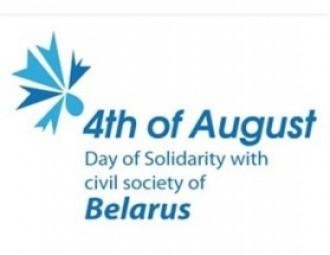Invitation to join the International Solidarity Day With Civil Society in Belarus

4 years ago, on the 4th of August, the International Day of Solidarity with civil society and human rights movement in Belarus was launched.
Ales Bialiatski, one of the leading Belarusian human rights defenders, was arrested. The Committee of International Control over the situation with human rights in Belarus together with several other NGOs and initiatives decided to start the International Day of Solidarity with civil society and human rights movement in Belarus.
Since then, each year on the 4th August people from over 20 countries have picketed for Belarusian activists, created and spread banners and leaflets about Belarus, written postcards to political prisoners, taken photos with the symbols of the Day, organized photo exhibitions, debates etc.
According to a Memorandum signed by several organizations worldwide, this day will be marked until the situation of civil society in Belarus changes, prison sentences for promotion and protection of human rights disappear, and basic human freedoms such as freedom of expression, assembly and association, are guaranteed.
Assembly of NGOs invites everyone to join the Solidarity action on 4 August 2015!
This is how you can help to prepare for the 4th August:
- spread the word about the Day of solidarity;
- create and spread awareness-raising materials;
- post about the Day on Facebook, Twitter, etc. with the hashtag #4Aug;
- organize actions in your area.
You can find more details on what can be done here.
If you would like to join the team, please send an e-mail to [email protected]. Everyone is welcome!
-
03.01
-
07.10
-
22.09
-
17.08
-
12.08
-
30.09



























